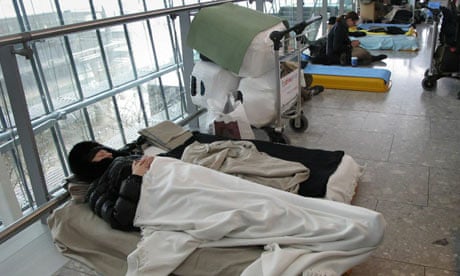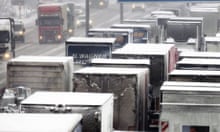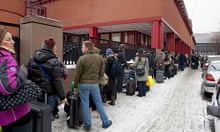Britons might have to get used to power blackouts and disrupted travel plans as the country struggles to cope with the long-term effects of climate change, a report for the government has warned.
Consumers will have to learn they cannot expect cheap heating and lighting and to go where or when they want as floods, rising temperatures and higher sea levels threaten the UK's road, rail, water and energy networks, it says.
If that warning was not sombre enough in a month when air, rail and road travel has been badly hit by the weather, mighty storms and changes in wind direction could threaten some of the country's busiest ports and airports. That would mean the abandonment of coastal docks and increasing pressure for the building of new runways throughout southern Britain.
An independent horizon scanning report for the Department for the Environment, Food and Rural Affairs on how well prepared energy, transport and water infrastructure is to cope with climactic changes expected between 2030 and 2100 presents a challenging, even bleak, picture. It identifies a general lack of long-term foresight, with capital investment at present depending too much on short-term returns and businesses tending to look no further than six to 12 years ahead. The authors argue that social attitudes and behaviour need to change too.
Official UK climate projections published last year predicting hotter and drier summers, warmer and wetter winters, rising sea levels and more floods, storms and heatwaves, provide a basis for analysing many of the risks threatening vital infrastructure. But URS a global consultancy and management company, also warns that ports and airports could face as yet unquantified threats from changes in prevailing winds, although it admits evidence on which such predictions could be made is, as yet, scanty.
It says: "Even with many changes, current levels of supply and infrastructure functionality may not be possible at reasonable cost. We need to ensure the general public understands the constraints and challenges." Another part of the report says: "Customer expectations in the UK are high. Customers do not expect interruptions to supply, restrictions on use or loss of quality, yet they demand low costs."
The study, which was started under the previous government, will feed into a cross-government project to identify what climate change will mean for key networks. The project also involves major power and water companies, airport, port and rail operators and motoring organisations.
The project makes clear a big and expensive programme of sea and flood defences will be necessary. The coalition government has just slashed spending in this area, a decision critics have warned will prove a false economy. Some areas of eastern England are already under threat – the gas landing installations at Easington, Yorkshire, is already considered "highly vulnerable" to flooding, for instance – but the report warns some existing quaysides may have to be made higher and more inland ports such as Goole, Yorkshire, 50 miles from the open sea developed.
This would be "an expensive and radical option" but might be necessary "if conditions deteriorate substantially". It would mean abandoning billions of pounds of existing assets in "at risk" locations and could provoke a business and public outcry, the report concedes.
Plans for a third runway at Heathrow were dropped by the coalition government, but the report says: "The growth in the airline industry is likely to require further infrastructure on the ground, possibly new airports, new runways and longer runways." It also notes runways at UK airports are aligned either east-west or southwest-northeast depending on the prevailing wind. "Many only have a single runway or parallel runways, which means on days when there is a strong cross wind, there can be severe disruption. These airports could therefore be vulnerable to a change in prevailing wind direction, but there is no robust climate prediction for this parameter."
On energy, the report asks: "Should we expect there to be electricity black-outs or periods where gas is unavailable?" One alternative would be for every home to be able to use low-carbon electricity when available and gas (perhaps supplemented by local anaerobic biogas) when it was not. A gradual shift to renewable energy sources, such as sun, wind, waves and tides, which are dependent on climactic conditions for providing electricity, might make stability through a grid system difficult to guarantee.
A Defra spokesman said : "We've seen these last few weeks how extreme weather can affect our lives, so energy providers, transport systems and water suppliers need to think about how well they're equipped to deal with a changing climate.
"The government can help them to adapt, but the investors, owners and operators of these facilities also need to recognise the financial benefits of investing to ensure their business and assets can cope whatever the weather."






Comments (…)
Sign in or create your Guardian account to join the discussion